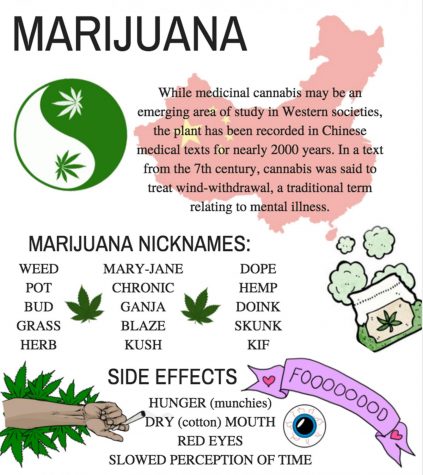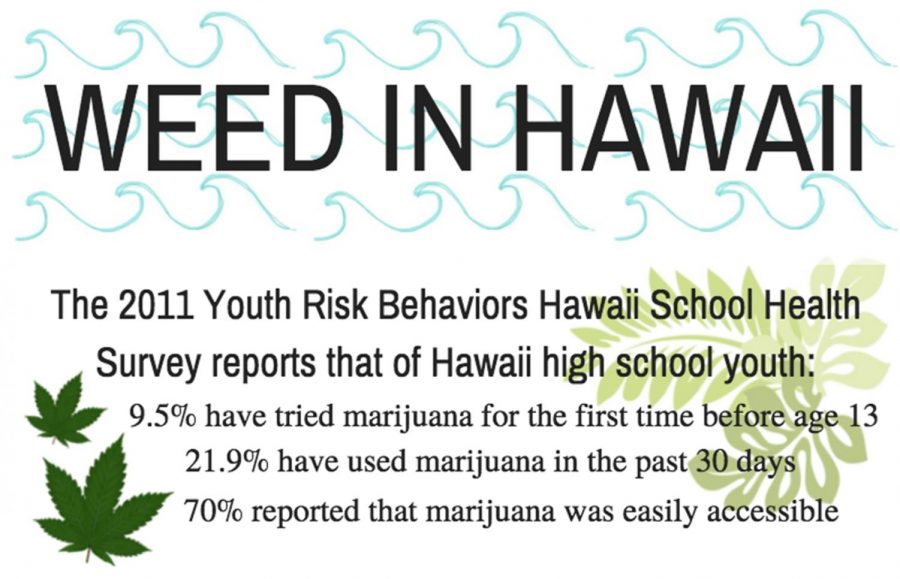Marijuana Law Reform Hides Potential Benefits, Risks
March 16, 2018
 There have been numerous influences with the mission of preventing young people’s use of controlled drugs, but recently, smoking marijuana has gained increasing acceptance. Lately, there has been massive support for marijuana law reform. According to CBS News, 88 percent of Americans support medicinal use and 61 percent think the recreational use should be legal. Drug Policy Alliance believes that marijuana should be removed from the criminal justice system and regulated like alcohol and tobacco.
There have been numerous influences with the mission of preventing young people’s use of controlled drugs, but recently, smoking marijuana has gained increasing acceptance. Lately, there has been massive support for marijuana law reform. According to CBS News, 88 percent of Americans support medicinal use and 61 percent think the recreational use should be legal. Drug Policy Alliance believes that marijuana should be removed from the criminal justice system and regulated like alcohol and tobacco.
In Hawaii, medicinal marijuana is legal and the Hawaii Department of Health is responsible for administering medical cannabis programs. However, recreational use of the drug is classified as a misdemeanor penalty.
Despite this drug being illegal, Hawaii residents still partake in the recreational activity. According to the National Organization for the Reform of Marijuana Laws, Hawaii has the 10th highest marijuana usage rate in the nation among those over 18. But marijuana’s popularity in the state does not erase the damage it can do, which is why there are varying pros and cons on the law reform.
Pro: Stress Relief
Those who are not unfamiliar with marijuana may experience some paranoia when smoking for the first time, especially when taken in large doses. That being said, it may be hard to understand how marijuana could be a stress relief. How does cannabis help anxiety when it also increases paranoia?
Reasons for Paranoia
A reason that use of marijuana could potentially trigger panic attacks is because of the chemicals in the cannabis plant. These chemicals are called cannabinoids and when smoking cannabis, they release and engage with the body. Because endocannabinoids activate certain cell receptors abundant in the brain, it wakes a network in the body called the endocannabinoid system. This network manages cognition, memory, metabolism, and mood. Cannabinoids such as psychoactive tetrahydrocannabinol, more commonly known as THC (the cannabinoid responsible for creating the euphoric high that is desired) engages cell receptors in the amygdala, which controls emotions, fear, and survival instinct. Because of this, users experience a feeling of panic.
But researchers have not discovered marijuana use as a risk for developing anxiety. In fact, many users report that marijuana reduces their overwhelming stress.
Not only has weed soothed short-term stress, but scientists are starting to uncover evidence that marijuana may be a highly effective treatment for anxiety disorders.
A study from Vanderbilt University found that smoking weed can increase brain chemicals called endocannabinoids, which are reduced as a result of chronic stress. Researchers think that a reduction of endocannabinoids could be a major cause of anxiety disorders.
Natalie Lobdell (12) is a person who has personally struggled with overwhelming anxiety. She is in favor of the marijuana law reform because she said, “It helps with stress and anxiety.”
Anxiety is not simply an excuse to get high. Anxiety is a nervous disorder characterized by a state of excessive uneasiness and apprehension. Marijuana is a natural substance that some prefer as a healthy substitute to prescription drugs.
Con: Impact on Teens
Ralia Techur (11) supports the medicinal use, but is unsure of legalizing recreational use of marijuana, especially when it comes to teens.
“I think it should be legal to people over 21 but teens I think it shouldn’t,” she said. “I think it distracts them too much and makes their actions more stupid. Like, they do more stupid things when they’re high.”
Techur was accurate when bringing up reckless behavior. While smoking marijuana can be beneficial, there are facts to back up the reasoning behind the stoner stereotypes. In long-term studies, teens who smoke marijuana have lower IQs later on, as well as structural differences in their brains.
A 2016 study on almost 300 students by the University of Montreal found that teens who start smoking marijuana at or around the age of 14 do worse on cognitive tests by age 20 than those who do not smoke. Those that choose to smoke also have a higher high school dropout rate.
The argument that weed is a gateway drug has been continuously repeated by parents and teachers, but the majority of teens find that argument to be utter nonsense. However, marijuana has been proven to be a gateway drug. Nearly all adults with substance problems have initiated their drug use early in their teens, usually beginning with alcohol and marijuana. Early initiation of drug use primes the brain for enhanced drug use later on in life.
Legalization of marijuana increases availability of its use; however, stating that the legalization of marijuana will have lasting negative effects on future generations has not been proven to be true. If people wait until age 17 to start smoking, they do not experience the same effects, according to the university study.
Pro: Tax Revenue
Some students share personal reasons why marijuana would be beneficial, but others, including Jon-Daniel Guerra (11) and De Shawn Cornelius (12), shift their attention to a point that will benefit the country.
“Yes [marijuana should be legal] because we can make millions off of revenue alone,” Guerra said.
Cornelius agreed, and said, “It would promote economic growth that the country would benefit from.”
To further explain, legal sales of cannabis products amounted to $996 million in 2015 and the tax revenue collected off those sales was a shocking $135 million.
Jordan Frazier (12) said, “If marijuana was to become legal, the government would be able to regulate it and create a profit for the government and that money can be used to make our country better.”
Improvements that Frazier exemplifies include education and healthcare. Oregon taxes marijuana at 17 percent and the tax money is distributed mostly to the Common School Fund, and services for mental health, drug, and alcohol abuse.
Hawaii’s cost of living is the highest of any of the 50 states or Washington, D.C. and tax-money does not completely provide all the needed funds for public projects. Tax revenue collected off marijuana sales can be used to fix roads, fund projects, hire more police and firefighters, and pay teachers better.
Con: Bad Weed
Quality cannabis buds are free of mold and mildew. One of the testing labs certified by the state to check the quality of medical marijuana said they found contamination in more than half the samples. The lab, Steep Hill Hawaii, says over 50 percent of the black market product had contaminants that included mold, yeast, and pesticides. All of which can be harmful if ingested.
Ingest or Inhale?
The presence of mold and yeast on marijuana increases the harm done to a person’s lungs. Even smoking quality marijuana harms the lungs, according to the National Institute on Drug Abuse. An alternative to this is edibles. Despite the elimination of toxic chemicals smoking creates, edible cannabis contains its own risks.
The doses in edible cannabis can vary significantly which makes it difficult to control the high, especially because cooking the drug ends up creating a far stronger compound the body receives after a person ingests the drug. Two students were hospitalized from the Big Island on March 9 for eating marijuana laced brownies.
Because the marijuana industry is fairly new, there is not a significant amount of research done to determine which is better or worse. But what is known is that a part of the brain called the striatum slows down when exposed to THC. Scientists say that the striatum helps people understand sensations exposed to, therefore less activity in the striatum could mean having a harder time making sense of surroundings.
In extreme cases, it causes a type of psychosis that scientists have compared to schizophrenia.
So ingesting or inhaling cannabis could be dangerous because THC remains the active ingredients of both marijuana intake methods with potentially adverse consequences.
Pro: Better Alternative
“There are tons of drugs that are legal like alcohol and prescription drugs that kill thousands of people a year,” Frazier said. “I think [marijuana] is a better alternative to other pharmaceutical drugs that have the risk of addiction and side effects.”
Opioids are a class of drugs taken illegally like heroin, but also legally as by prescription as pain relievers. They interact with opioid receptors on nerve cells in the body and brain. Regular use, even as prescribed by a doctor, can lead to addiction and can lead to overdose incidents and deaths. A 2017 assessment of medical cannabis patients in Illinois report using marijuana as an alternative to other medications, most commonly opioids, but also anticonvulsants and anti-inflammatories.
Benzodiazepines, also known as Valium or Xanax, are a class of drugs primarily used for treating anxiety, seizures, and insomnia. While many are satisfied with the pleasant relaxation resulting from the drug, all benzodiazepines can cause a physical dependence and the withdrawal symptoms are rough. If taken for longer than a few months, instant withdrawal can cause common withdrawal symptoms like seizures, insomnia, vomiting, and sweating, according to the American Addiction Centers. It can also cause more severe symptoms like slowed heartbeat, difficulty breathing, hallucinations, and tremors.
The argument that marijuana is a healthier alternative to prescription drugs is not baseless. “Marijuana itself has not killed anyone,” Frazier said.
Con: Reckless Behavior
While studies have shown that marijuana could be beneficial, there is the risk of people abusing the drug. Statistics show that homelessness has increased in Colorado since the legalization of cannabis. According to a recent study, 9.7 percent of respondents reported that they had smoked weed before coming to work.
In Colorado, employees can be terminated for testing positive for marijuana, despite the fact that it is legal in the country. Nearly 70 percent of organizations in Northern Colorado drug test their employees and more than half of them fire employees who test positive, based on information from The Tribune.
However, there is significant doubt over whether the drug reform contributed to increase homeless. There is no strong evidence that links the legalization of marijuana in Colorado to its increase in homelessness.
Pro: Less Marijuana Prosecutions
According to the American Civil Liberties Union, marijuana arrests account for over half of all drug arrests in the United States. Though very few of these arrests lead to prosecutions, imprisonment can still result from distribution or possession.
Brooke Bond (12) has dealt with this personally when her father was arrested for a drug-trafficking conspiracy.
“He was really my only stability,” she said. “So when he went to prison the end of my freshman year I was lost and didn’t really know what to do.”
She now lives in Hawaii with her aunt and uncle, but still misses her dad very much.
“I got to spend 15 years with my dad but I am also the oldest of my siblings. My little brother wasn’t even one when my dad went to prison,” Bond said. “My dad is my favorite person in the world. I think in my opinion what he did was not bad at all. He was disabled when he was 17 and provided for his family how he knew how.”
“He went to jail because the FBI eventually caught on to what he was doing. They had an investigation going on that lasted a few years. But they never even caught my dad with a gram of marijuana. They arrested him off of conspiracy and people snitching on him.”
The last time Bond saw her father was June 1, 2017, and she doesn’t know the next time she will be able to see him.
She said, “I do not know the next time I will be able to see him since I am moving to Colorado for college and he is in Massachusetts. I am moving to a place where marijuana is legal while my father is serving 12 years in a federal prison for the same exact reason.”
Final Point
There are numerous factors that affect which side of the marijuana debate people fall on.
The substance can assist people with anxiety, can be an alternative to prescription drugs, and has the potential provide funds for public projects if legalized recreationally.
There are also negative health effects and the possibility reckless behavior in teenagers who use the substance.
The legalization of marijuana has the potential to do good; however, there are negative aspects that could counteract the benefits.








